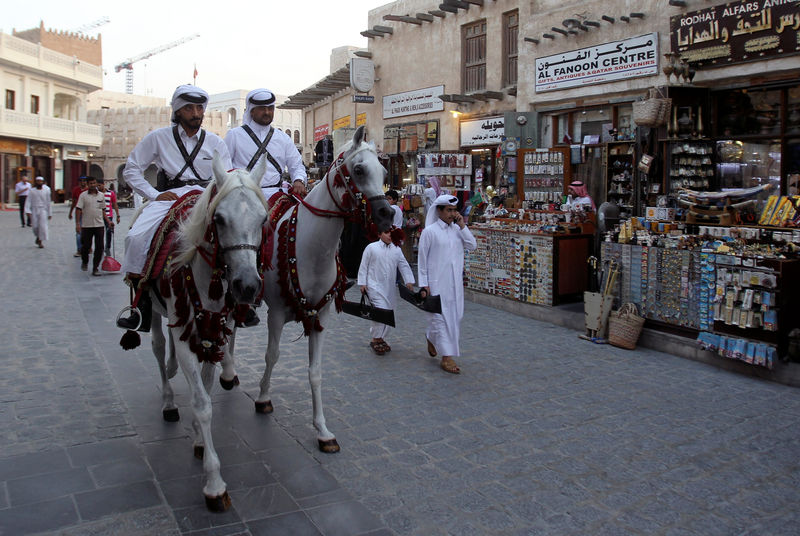By Tom Finn
DOHA (Reuters) - Fly economy class, share an office, cancel journal subscriptions: these are some of the requests being put to government employees in Qatar, as low energy prices force austerity even among the world's wealthiest citizens.
With huge offshore gas reserves, a small population and billions of dollars of foreign assets, Qatar has weathered the global oil price slump since mid-2014 better than many of its Gulf Arab neighbours.
But the decline in state energy income comes at a time when Doha is pursuing a $200 billion infrastructure upgrade for the 2022 football World Cup and building ports and hospitals, squeezing finances and leading to budget cuts.
The foreign workers who make up the bulk of Qatar's 2.3 million population have borne the brunt of cutbacks; thousands have lost their jobs as the government has sought to shield its citizens from the impact of austerity.
But the world's top liquefied natural gas exporter faces a $12.8 billion (9.76 billion pounds) budget deficit this year, its first deficit in over a decade, and has halved its forecasts for economic growth.
Now even the 300,000 citizens of the world's richest nation per citizen are feeling the pinch in a shake-up of state entities, which employ about nine out of 10 Qatari workers.
"Your responsibility in light of the falling oil prices is bigger," Qatar's Emir Sheikh Tamim said in a November speech that warned against "waste and extravagance", and said the state could no longer "provide for everything" as the country diversifies its economy away from oil and gas.
The austerity measures may be light compared with those felt by expatriate workers and poorer energy-producing countries, but they have nevertheless unnerved some locals for whom affluence and stellar economic growth have been the norm.
A merger of several ministries early this year did not affect the salaries or benefits of Qataris - which are still viewed as sacrosanct - but did entail sharp cuts in "discretionary" spending, according to three government ministry officials.
"We stopped receiving a daily paper," said one of the officials, who said colleagues had been encouraged not to fly business class and to cut back on trips abroad for overseas conferences.
"Journal subscriptions were cancelled. Some who had their own offices were moved into shared offices."
The economy, finance and labour ministries did not respond to requests for comment
OVERSEAS TRAVEL
Another official, from the labour ministry, said as a result of the merger hundreds of Qatari government employees had been left with no work since January as the government scrambled to find them new positions while continuing to pay their salaries.
Staff in the labour ministry were told that travelling abroad for further education while working for the government - an appealing aspect of the job for many Qataris - was now limited to those pursuing technical or vocational degrees, the official said.
He and the other officials declined to be named as they are not authorised to speak publicly.
Qatari authorities say the oil price slump provides an opportunity to curb the excesses of government agencies that have been plagued by inefficiencies for years.
An economic adviser to the government, who also asked to remain anonymous as he is not authorised to speak publicly, said there was a freeze on recruitment in some government departments and more scrutiny on spending. He said reducing inefficiencies, while painful, would benefit the state in the long run, even once oil prices rebounded.
Many Qataris are drawn to public-sector positions which typically involve more favourable working hours and better salaries and benefits than private companies.
It is not yet clear how successful the efficiency drive has been, although in the 2016 budget "minor capital expenditure", an area of discretionary spending that traditionally includes smaller building projects such as refurbishments, fell by 70 percent year-on-year.
Salaries account for 50 billion riyals ($13.7 billion) - about a quarter - of Qatar's expenditure.
Previous austerity steps in Qatar, such as utility bill rises in late 2015 and a reduction in fuel subsidies earlier this year, have fallen hardest on poorly paid foreign construction workers - as will a 5 percent sales tax on consumer goods and services planned for 2018.
This trend risks increasingly polarising the country between wealthy Qataris at the top and Asian blue-collar workers at the bottom.
However Syed Bashar, a former economist with Qatar's central bank, said Qatari workers could increasingly feel the weight of austerity as the government targets state entities to narrow the deficit.

"The government will not be able to provide the vast majority of Qatari jobs indefinitely," he added. "Nor can it guarantee that salaries keep rising as they did. This will be upsetting for some nationals."